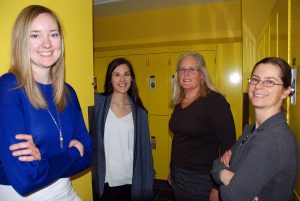By: Kathy Brodeur-Robb, Executive Director, C17 Council
With input from Gabrielle Siegers, Research Associate, Department of Experimental Oncology, University of Alberta, and Brittany Umer, Graduate Student, Dep’t of Medical Microbiology & Immunology, University of Alberta.
BioCanRx invited participants from the Cancer Stakeholder Alliance to help develop the BioCanRx Learning Institute. “Sure!” I said; it seemed like a good idea to develop a model of public – patient engagement in the context of a scientific conference on cancer immunotherapy.
From the other side, graduate students, fellows and young investigators were given the option of being part of a “buddy system” being developed to facilitate this engagement. Extra bonuses of the conference included getting to network, participating in something new and exciting, having expenses covered and adding a great note on the CV.
One thing we did not expect was how rewarding and fun the experience would be, and how the four-day conference has turned into a continuing conversation about science, opportunities, careers and learning. Participating in the BioCanRx Learning Institute was a rewarding and enriching experience for both the patient/public participants as well as the young scientists with whom we were partnered; there occurred probably more two-way learning than either side had expected.
Early each morning of the conference we could be found analyzing presentations, sharing what we learned, learning what works well to translate science to a broad audience, and bonding over coffee. The shared experience of learning together, exchanging interpretations, and realizing that both scientific and public attendees found common ground in our “take” on presentations was encouraging.
There was never enough time to talk over all the things we wanted to share; even starting an hour before the conference left us hurrying to try and get to talks on time.
But there were lasting impacts: shared emails, connections on social media and promises to meet at future conferences. In Edmonton, we have continued to keep a local conversation going – sharing ideas, lunch, conversations about careers, and invitations to attend science-themed events (most recently, the play “The No Belles” staged in Edmonton).
The Learning Institute is living up to its name. Public/patient advocates and young scientists connected, they learned from each other and the learning continues. I hope that the experience of participating in the Learning Institute opens eyes and opens doors for these young scientists, and that it will make them more successful in whatever career they choose. I want to see these enthusiastic young scientists succeed and, as a leader in a cancer research non-profit, I hope that I can help them achieve career success, because we need them as much as they need us.
